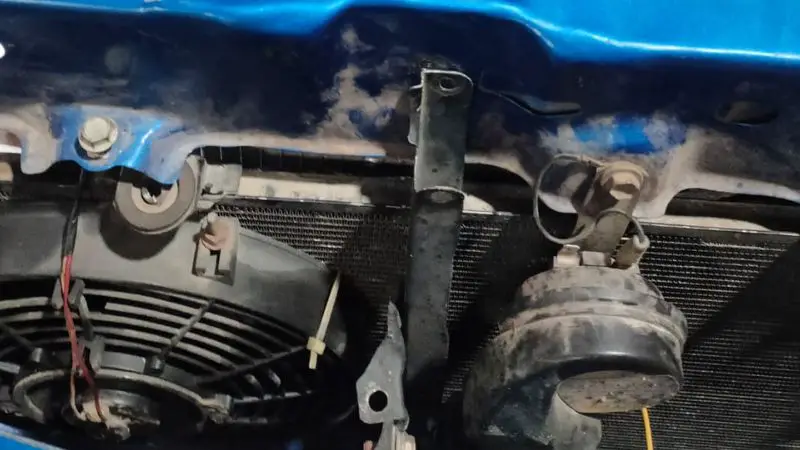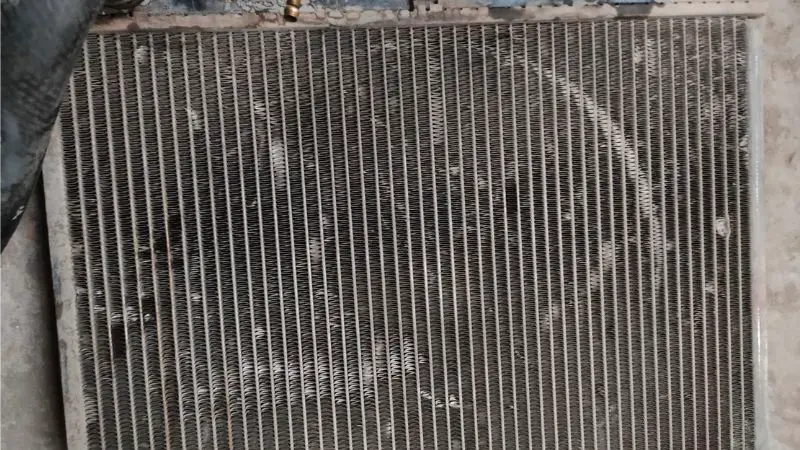An intercooler is an appliance fixed to the intake of cold air into your engine, fitted with a turbocharger system. If there is oil in the intercooler pipe, this shows that your turbocharger has a fault. Due to oil in the pipe, your turbocharger will fail. That’s why you should fix it immediately.
Ignoring this will inhibit the performance of your engine and intercooler. However, let’s learn the causes of the small amount of oil in the intercooler pipe and its solution.

Is It Normal To Have A Small Amount Of Oil In Intercooler?
No, oil in the intercooler is a bad sign which can damage the turbo. Turbos use oil to cool and lubricate the rotating bearings in the turbo. Nevertheless, the seals and gaskets should seal the turbo oil.
Correspondingly, seeing a few oil stains on the intercooler in high-mileage or older vehicles is relatively standard. Subsequently, this is just a sign of aging, worn seals inside your turbocharged.
Oil In Intercooler Pipe Symptoms:
Spotting the oil symptoms in the intercooler pipe on time can significantly extend the engine life. Symptoms can vary, but here are some key signs to look out for:
Reduced Strength and Performance
Accordingly, if your car’s engine doesn’t feel as strong, it could be because the intercooler is not working. The job of an intercooler is to cool and compress the air so the engine can run smoothly. Hence, if it doesn’t work, the engine won’t run properly. Besides, it can cause your automobile to slow down and have lower energy than usual.
Cracked Intercooler
Adequately, if there is oil in the intercooler, it can be cracked intercooler symptoms. Likewise, it can damage your crankshaft.
Abnormal Smoke from Exhaust
If the intercooler is clogged, it can cause the engine to overheat. Thus, this can cause the oil to burn and smoke from the exhaust. The color of the smoke can be blue or black. This means there may be something wrong with the intercooler.
Overheating Engine
The intercooler helps cool the air from the turbocharger before it goes to the engine. If it is not working, it shuts down, and hot air enters the engine. Excessive heat can damage the machine, and you can hear bad sounds.
Running Lean Or Rich
If your intercooler gets oil, it can affect the engine’s air-fuel mixture. That means there can be too much air or too much fuel. Too much power thickens your car’s exhaust and uses more gas. Moreover, Too much air overheats your engine and can damage it.
Increased Fuel Consumption
Your car can use more fuel because the oil in the intercooler pipe isn’t working. If the engine doesn’t get enough cool air, it will take more fuel than usual.
Check Engine Light
If your car’s intercooler isn’t working, it may turn on the check engine light or other dashboard lights. Your vehicle’s Engine Control Module (ECM) checks how things work. And if something isn’t right, you can see the warning light on the dashboard. These symptoms can cause severe damage to your engine.
The Reasons For Oil in Intercooler Pipe:
Here we have discussed the reasons for oil in the intercooler pipe. Have a look:
Turbo Damage
A damaged or bad turbo will enhance pressure due to oil and garbage blowing from the damaged turbo into the intercooler. Due to turbo-blowing oil into the intercooler, your turbocharged can be damaged.
Too High Oil Pressure
Abnormally high oil pressure can shut off oxygen, stress the intercooler, and cause it to burst.
Air Filter Intake Obstruction
Air filter intake blockage can reduce power and acceleration. The vehicle may idle more, and the check engine light will come on.
Wrong Gaskets
Correct gaskets and gasket breakage will prevent much oil from leaking into the intercooler pipe.
Poor Engine Efficiency
The hotter the engine gets, it won’t run as correctly as it should. It may seize up, and you won’t be able to reach the speed you need.
Exhaust Smoke
If you can see the smoke from the exhaust, which isn’t usually present, it’s the sign. It’s because the oil into the intercooler, causing smoke to burn the oil.
Oil Leak on The Crankshaft
Oil leaks from the crankshaft usually flow from the bearings to lubricate the camshaft. This usually involves a crankcase oil leak. Oil will also come out of the piston tops and sides.
Leaking Intercooler
This is a simple hazard that you can pay attention to by checking the condition of the intercooler air duct. To check the oil in the intercooler, you should know about the coming-out oil color. When the oil comes out of the intercooler, it looks cloudy with a blue tint.
Improper Cleaner Used in Intercooler
The job of an oil cleaner is to remove the splashed oil from the intercooler. But if you use improper cleaners, it can increase your intercooler damage.
Turbo Leaking Oil Into Intake:
Turbo oil leaking into the intercooler is a problem you should always pay attention to. This will cause various issues. A faulty PCV system, worn-out turbo seal, and dirty air filter can cause oil to leak from the turbocharger.
Over-speeding
If the car speeds up, your intercooler may have oil in it. It’s because it has a cooling system to condense the hot air from the turbocharger. Overspeed also puts tremendous strain on the engine. So the intercooler can’t cope with this pressure. Also, overspeed loses pressure, decreasing the effectiveness of the intercooler.

How To Fix Oil In Intercooler Pipe?
Since the oil in intercooler pipes can cause many problems, after finding out the causes and symptoms, you should fix them. Let’s know how to fix them below:
Use degreasers and gasoline to remove oil.
Using a degreaser and gasoline to clean the oil is best. Additionally, it can clean the oil properly from rust in the intercooler. Other chemicals, such as kerosene and acetone, can be used.
Flush the intercooler ducts.
You can flush the conduit for the intercooler using the hose. It depends on the make and model of your vehicle, so check your manual. The process is simple – attach a water hose or garden hose to the filler cap. And then run water through the system while the engine is running.
Check for any problems with the pipe.
Before removing the intercooler, you must check the pipe. There can be many problems with pipes. Clogging may occur, but you can find it easily when you remove the intercooler.
There may be something wrong with the pipe that you should determine. Once you have chosen the problem with the pipe, then you can fix it.
Installing a more robust Bash Plate
After cleaning and testing, you need to install a strong bash plate. Reputable mechanics should perform a pressure test, an interior and exterior cleaning, and a leak repair. For better protection and to avoid the recurrence of the problem, some car owners opt for a more stable front bumper plate.
Installing a catch can
Installing an oil catch can, a nearly easy process, is a method that can be highly effective. Also, there are a variety of aftermarket offers and options. For example, condensation buildup and oil leaking problems are to catch most of the EcoBoost vacuum line.
However, this technique has some disadvantages. Installing a catch may mean you have to drain it regularly. The goal of an effective catch can be to recirculate oil vapors without changing the emission components.
Engine room ventilation
Today most of the new vehicles are usually turbocharged or supercharged. As a result, oil and condensation problems are getting worse. When the performance is upgraded, the positive crankcase pressure can be higher than the OEM PCV. Consequently, the amount of piston ring blow-by will also increase.
Dragging of the hose and sticky sludge from the intercooler indicate that the PCV is clogged. A blocked PCV system draws oil into the cylinders, which makes a misfire. The PCV system is more than a check valve in the latest engines.
The OEM PCV system can handle most crankcase ventilation easily. Advanced applications require more airflow over stock to allow crankcase vapors to escape. You can solve this problem by increasing the hose’s internal diameter, adding lines, or reducing the pressure.
Replace the Intercooler Pipe
Adequately, if your engine intercooler pipe is worn and old, you will need to replace your pipe. Therefore, old pipes can contaminate and rust which leads to engine damage. Plus, if the pipe is punctured or broken, you should replace it.
Check: Oil Cooler Replacement Cost
FAQ (Frequently Asked Questions)
Q. Is it normal for turbos to leak oil into the intercooler?
No, oil leaks can be caused by many factors, the leading cause being incorrect pressure between the compressor and the turbine housing. Turbos are not supposed to leak oil. They are made to stop oil from the intake. If you have oil problems, the seals may be suspect.
Q. How to clean oil out of the intercooler?
- Loosen the radiator grill bolts and pry the grill forward.
- Unscrew the bumper bolts, then remove the engine cover and wheel arch bolts. Now disconnect the hose and cable. Then you can take the bumper off carefully.
- Remove the bumper mount and pull the plug for the headlamp. For the bonnet, disconnect the two-part Bowden cable.
- Remove all the bolts and lugs for the front fairing and headlamp. To do this job, you can get help from someone.
- Now place a can under the cooler, leave the clamps, and eliminate the intercooler hose. Just remove the oil cooler from your intercooler.
- Tilt the intercooler down and pull it to the side. Typically, you must flush the intercooler with brake cleaner and shake it out.
- Enough oil will come out, so repeat this method a few times. After doing this process, take a break for a minute in between.
If you run it in your home garage, this process will take several hours. If you have no experience doing it, you’d better leave the job to the professionals.
Q. How to fix a leaking intercooler?
It’s not a good idea to fix a leaking intercooler. The reason is that if you fix your intercooler, you can use it for a couple of weeks or temporarily. However, some forums recommended using JB Weld to fix the leaking intercooler. You can’t use them permanently.
If your intercooler has a hole, it’s best to replace it. No way to repair such parts will keep you satisfied for long. When you drive your car, it holds high pressure. So to tolerate pressure spikes and other problems, it should be adequately ready.
Check: Oil Cooler Line Leaking At Radiator
Final Word
To enable the intercooler to work correctly, you should solve the problem of oil in the intercooler pipe. Otherwise, the engine will overheat, and you can’t get the best performance from your machine. So checking the car cooling system is very necessary.
When running 1000hp, you should have a catch can that ensures you have a vacuum on it. So it sucks the oil into the can instead of the intercooler. When you notice a problem with your turbo leaking but can’t fix it, consult your mechanic.
